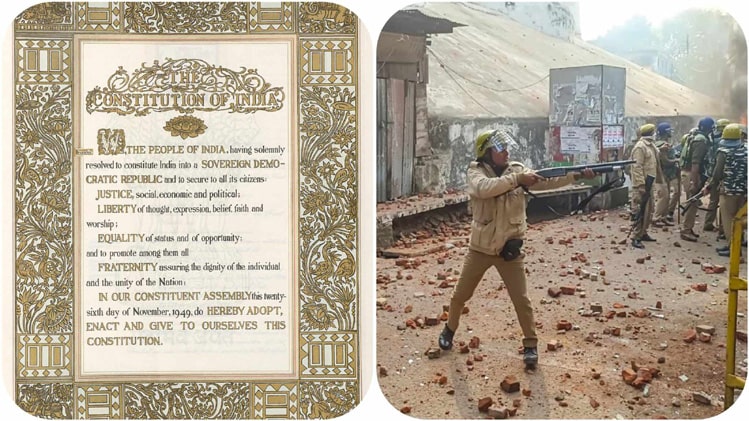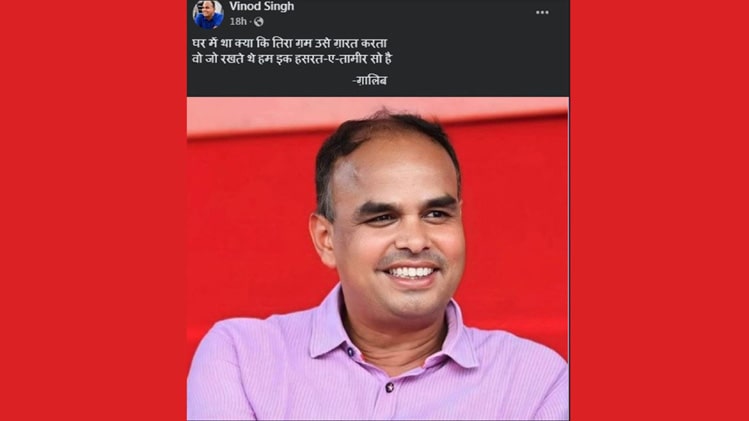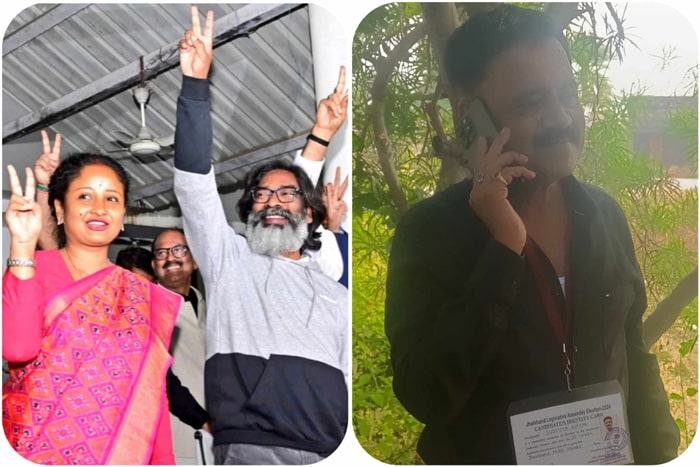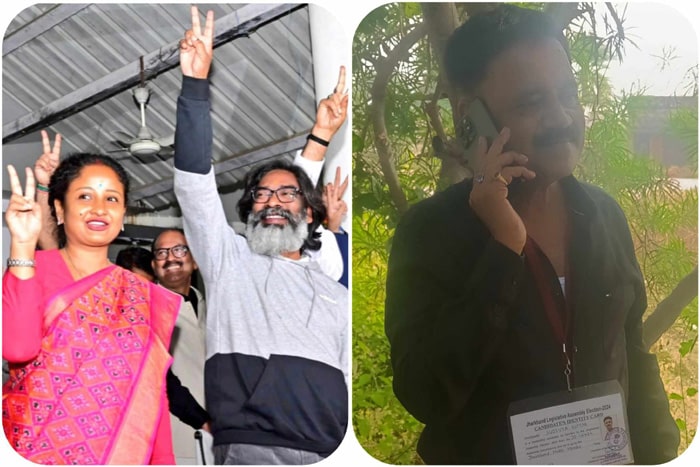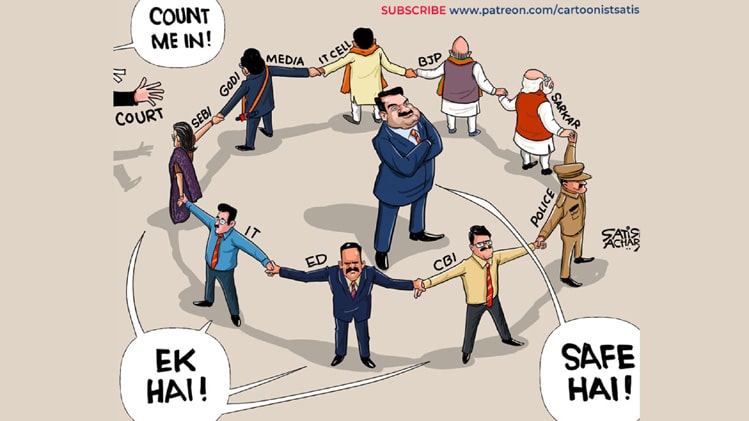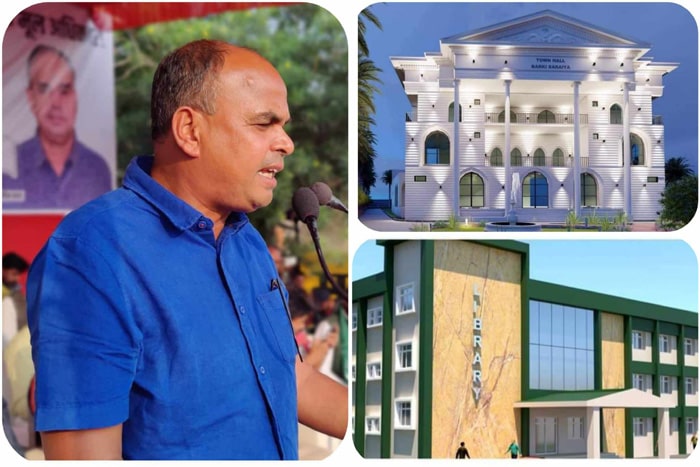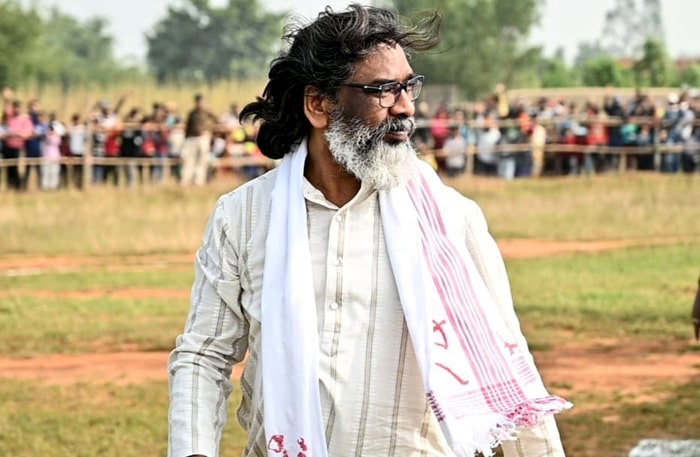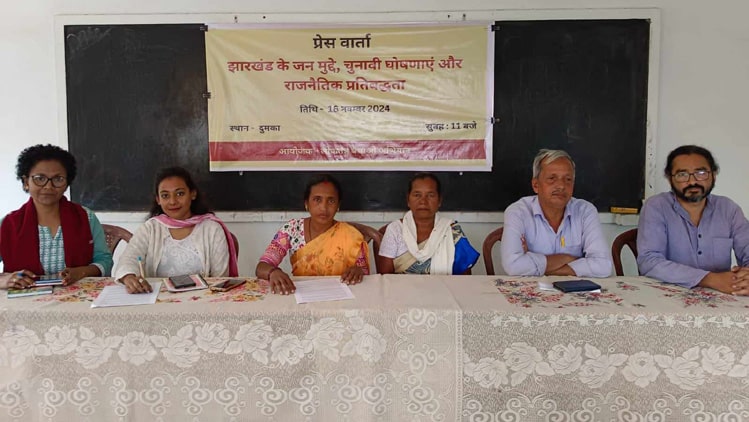जारी:
अडानी को लेकर श्रीलंका में राजनीतिक बवाल
श्रीलंका की नवनिर्वाचित वामपंथी सरकार ने राष्ट्रपति अनुरा कुमारा दिसानायके के नेतृत्व में भारत के दक्षिण में स्थित इस द्वीप राष्ट्र में पिछली सरकार द्वारा अडानी समूह को दी गई 44 करोड़ डॉलर की पवन ऊर्जा परियोजना पर पुनर्विचार करने का फैसला किया है। श्रीलंका के सर्वोच्च न्यायालय को बताया गया है कि हाल ही में हुई कैबिनेट बैठक में सौदे की पारदर्शिता पर संदेह व्यक्त किए जाने के बाद सौदे की समीक्षा शुरू की गई है।
श्रीलंका में अडानी समूह की यात्रा कोलंबो बंदरगाह के एक महत्वपूर्ण हिस्से को विकसित करने के साथ शुरू हुई थी, जो अपनी भौगोलिक स्थिति के कारण अंतर्राष्ट्रीय शिपिंग के लिए एक महत्वपूर्ण केंद्र है। एक आशाजनक उद्यम के रूप में शुरू हुआ यह काम जल्द ही भारतीय समूह के लिए एक अशांत प्रकरण बन गया। राजनीतिक विवाद और सार्वजनिक विरोध के बाद अंततः योजना में महत्वपूर्ण बदलाव हुआ।
2019 में, श्रीलंका सरकार ने अपनी प्रमुख आर्थिक संपत्ति कोलंबो बंदरगाह का विस्तार करना चाहा। भारत लंबे समय से श्रीलंका में चीन की बढ़ती मौजूदगी के मद्देनजर वहां अपना प्रभाव बढ़ाने की कोशिश कर रहा था। चीन ने पहले ही 99 साल की लीज अवधि के साथ श्रीलंका में विशाल हंबनटोटा बंदरगाह स्थापित कर लिया था।
अडानी पोर्ट्स एंड स्पेशल इकोनॉमिक ज़ोन (एपीएसईज़ेड) ने कोलंबो पोर्ट पर ईस्ट कंटेनर टर्मिनल (ईसीटी) के विकास को एक आकर्षक परियोजना के रूप में देखा, क्योंकि इसकी गहरे पानी की बर्थ और बड़े कंटेनर जहाजों को समायोजित करने की क्षमता है, जो इसे भारत के लिए एक रणनीतिक निवेश बनाती है। 2020 में, कई दौर की चर्चाओं और वार्ताओं के बाद, तत्कालीन राष्ट्रपति गोटाबाया राजपक्षे के नेतृत्व वाली श्रीलंकाई सरकार ने ईसीटी के विकास में भारत (अडानी समूह के माध्यम से) और जापान को शामिल करने के लिए एक समझौता किया । इस सौदे को इस तरह से संरचित किया गया था कि श्रीलंका बंदरगाह प्राधिकरण (एसएलपीए) को 51% स्वामित्व दिया गया, जबकि भारत (अडानी के माध्यम से) और जापान के पास 49% हिस्सेदारी होगी।
जैसे-जैसे सौदा आगे बढ़ा, ट्रेड यूनियनों, बंदरगाह कर्मचारियों और विपक्षी राजनीतिक दलों की ओर से इसका कड़ा विरोध हुआ — उन्होंने ‘ऐसी महत्वपूर्ण राष्ट्रीय संपत्ति’ को विदेशी फर्म को सौंपने के बारे में चिंता व्यक्त की। उनका तर्क था कि ईसीटी के महत्व को देखते हुए, इसका स्वामित्व पूरी तरह से श्रीलंकाई लोगों के पास होना चाहिए। बंदरगाह कर्मचारियों द्वारा हड़ताल किए जाने और पूरे देश में सार्वजनिक प्रदर्शन किए जाने से सरकार पर दबाव पड़ा।
बढ़ती अशांति और राजनीतिक दबाव के कारण श्रीलंका सरकार ने फरवरी 2021 में ईसीटी परियोजना को रद्द करने का फैसला किया, जिससे अडानी को बड़ा झटका लगा। इस फैसले ने श्रीलंका और भारत के बीच संबंधों को भी तनावपूर्ण बना दिया, क्योंकि इस सौदे के निरस्त होने को हिंद महासागर में भारत की भू-राजनीतिक महत्वाकांक्षाओं के लिए एक झटका के रूप में देखा गया।
कूटनीतिक संकट को कम करने के लिए, श्रीलंका सरकार ने प्रस्ताव दिया कि अडानी कोलंबो पोर्ट पर वेस्ट कंटेनर टर्मिनल (डब्ल्यूसीटी) विकसित करें। डब्ल्यूसीटी को विकसित करने का सौदा ईसीटी से अलग तरीके से संरचित था। यह 35 साल का निर्माण, संचालन और हस्तांतरण (बीओटी) समझौता था, जिसमें परियोजना को क्रियान्वित करने वाली इकाई में अडानी की हिस्सेदारी अधिक (85%) होगी, जबकि शेष 15% हिस्सा श्रीलंका बंदरगाह प्राधिकरण के पास होगा। डब्ल्यूसीटी, हालांकि महत्वपूर्ण था, लेकिन उसकी स्थिति ईसीटी जितनी रणनीतिक नहीं थी। अडानी ने वैकल्पिक सौदे को स्वीकार कर लिया।
तब तक, अडानी ने एक बड़ी पवन ऊर्जा परियोजना के ज़रिए द्वीप राष्ट्र की ऊर्जा प्रणाली में अपनी पैठ बनानी शुरू कर दी थी। यह श्रीलंका के 2022 के वित्तीय संकट के दौरान भारत द्वारा 4 अरब डॉलर का ऋण दिए जाने के बाद हुआ।
नवंबर 2021 में, एक श्रीलंकाई अधिकारी ने संसदीय समिति के समक्ष गवाही दी कि भारतीय प्रधानमंत्री मोदी ने मन्नार में पवन ऊर्जा परियोजना को अडानी को सौंपने के लिए श्रीलंका के राष्ट्रपति पर दबाव डाला था। कुछ दिनों बाद, इस अधिकारी ने, जो श्रीलंका के सीलोन इलेक्ट्रिसिटी बोर्ड (सीईबी) के अध्यक्ष था, ने इस्तीफा दे दिया। यह गवाही मोदी द्वारा ग्लासगो में जलवायु शिखर सम्मेलन के दौरान श्रीलंका के पूर्व राष्ट्रपति गोटबाया राजपक्षे से मुलाकात के ठीक बाद आई। हंगामे के बाद, सीईबी अधिकारी ने अपना बयान वापस ले लिया, इसके बावजूद उनकी सार्वजनिक गवाही की वीडियो रिकॉर्डिंग सोशल मीडिया पर तेजी से फैल गई।
यह पहली बार नहीं था, जब श्रीलंका में अडानी की भूमिका की जांच की गई। मार्च 2022 में, मन्नार और पूनरी में अक्षय ऊर्जा परियोजनाओं को विकसित करने के लिए सीईबी और अडानी ग्रीन एनर्जी के बीच एक समझौते पर हस्ताक्षर किए जाने के बाद, श्रीलंका की मुख्य विपक्षी पार्टी, समागी जन बालावेगया (एसजेबी) ने दावा किया कि अडानी ने ‘पिछले दरवाजे’ से प्रवेश किया। उन्होंने राष्ट्रपति गोटबाया राजपक्षे पर भारतीय प्रधानमंत्री मोदी के करीबी सहयोगी अडानी को प्रतिस्पर्धियों पर तरजीह देकर उनका पक्ष लेने का आरोप लगाया। एसजेबी ने 10 मेगावाट से अधिक क्षमता वाली परियोजनाओं के लिए प्रतिस्पर्धी बोली प्रक्रिया को खत्म करने के लिए बिजली कानून में संशोधन करने के फैसले की भी आलोचना की और आरोप लगाया कि यह अडानी को फायदा पहुंचाने के लिए किया गया था।
जून 2024 में विवाद और गहरा गया, जब श्रीलंका के सार्वजनिक उपयोगिता आयोग ने अडानी को 484 मेगावाट पवन ऊर्जा संयंत्र स्थापित करने की मंजूरी देने से इंकार कर दिया। अगस्त में, यह परियोजना कानूनी विवादों में उलझ गई, जब सुप्रीम कोर्ट ने निवेश बोर्ड और केंद्रीय पर्यावरण प्राधिकरण सहित सरकारी संस्थाओं को पवन ऊर्जा परियोजना पर अपनी आपत्तियां प्रस्तुत करने का आदेश दिया।
जैसा कि उल्लेख किया गया है, श्रीलंका के नए राष्ट्रपति दिसानायके, जो श्रीलंका पर भारतीय प्रभाव के लंबे समय से आलोचक रहे हैं, ने टेलीविजन पर एक टॉक शो के दौरान अडानी पवन ऊर्जा परियोजना को रद्द करने का संकल्प लिया। देश के उत्तरी हिस्से में मन्नार और पूनरी में परियोजनाएं स्थापित करने के विवादास्पद समझौते का जिक्र करते हुए उन्होंने कहा, ‘हां, हम निश्चित रूप से इसे रद्द करेंगे, क्योंकि यह हमारी ऊर्जा संप्रभुता को खतरा पहुंचाता है।’ समझौता ज्ञापन (एमओयू) के माध्यम से 2024 की शुरुआत में औपचारिक रूप से किए गए इस समझौते को सुप्रीम कोर्ट में चुनौती दी गई है।
1 अक्टूबर, 2024 को श्रीलंका के राष्ट्रपति चुनाव में अपनी जीत के बाद, दिसानायके ने सुप्रीम कोर्ट को सूचित किया है कि उनका प्रशासन अडानी की पवन परियोजनाओं को पिछली सरकार द्वारा दी गई मंजूरी पर पुनर्विचार करेगा।
बंगलादेश के साथ ‘भेदभावपूर्ण’ विद्युत अनुबंध
जून 2015 में, मोदी ने बंगलादेश का दौरा किया और उसकी बिजली की ज़रूरतों को पूरा करने में भारत के समर्थन का वादा किया। दो महीने बाद, अडानी समूह ने बांग्लादेश पावर डेवलपमेंट बोर्ड (बीपीडीबी) के साथ एक समझौता ज्ञापन (एमओयू) पर हस्ताक्षर किए। इसके परिणामस्वरूप, पूर्वी भारत में झारखंड के गोड्डा में 1600 मेगावाट का कोयला-आधारित बिजली संयंत्र स्थापित किया गया, जो बांग्लादेश को बिजली निर्यात करने के लिए समर्पित था।
दुनिया में गोड्डा जैसी कोई बिजली परियोजना कहीं नहीं है। भारत में कोयले के सबसे ज़्यादा भंडार झारखंड में हैं। फिर भी अडानी का गोड्डा बिजली संयंत्र उस राज्य से कोयले की प्रचुर आपूर्ति का उपयोग नहीं करता है, जहां यह स्थित है। परियोजना द्वारा उपयोग किया जाने वाला कोयला उत्तरी ऑस्ट्रेलिया के एबॉट पॉइंट बंदरगाह से जहाजों के जरिए लगभग 9000 किलोमीटर दूर ओडिशा के धामरा बंदरगाह तक लाया जाता है। क्वींसलैंड में कोयला खदान और भारत के पूर्वी तट पर बंदरगाह, दोनों पर ही अडानी समूह का नियंत्रण हैं।
धामरा पहुंचने के बाद, कोयले को पट्टे पर ली गई रेलवे लाइनों के जरिए 600 किलोमीटर दूर गोड्डा ले जाया जाता है। (इस रेलवे लाइन के उन्नयन के कारण विस्थापन का सामना कर रहे आदिवासी लोगों ने इसका विरोध किया था।) गोड्डा पावर प्लांट में बिजली पैदा होने के बाद, इसे 100 किलोमीटर से अधिक दूर बांग्लादेश के भेरामारा तक पहुंचाया जाता है, जहां से इसे फिर से वितरित किया जाता है।
2017 में, बांग्लादेश की तत्कालीन प्रधानमंत्री शेख हसीना की नई दिल्ली यात्रा के दौरान, दोनों सरकारों ने परियोजना को लागू करने के लिए एक समझौते पर हस्ताक्षर किए। बांग्लादेश में इस बात का विरोध होने के बावजूद कि समझौते की शर्तें अडानी के पक्ष में बहुत ज़्यादा झुकी हुई थीं, यह परियोजना, अपनी तार्किक विसंगतियों के साथ, आगे बढ़ी। इसके बाद बिजली की कीमतों को लेकर चिंता पैदा हुई।
इस अनुबंध को अत्यधिक महंगा और बांग्लादेश के हितों के विरुद्ध बताया गया है। रिपोर्ट्स से पता चलता है कि बांग्लादेश को अडानी प्लांट से बिजली के लिए देश की औसत बिजली लागत से पांच गुना अधिक भुगतान करना पड़ेगा। भले ही प्लांट बिजली का उत्पादन न करे, फिर भी बांग्लादेश को 25 वर्षों की अवधि में इसकी वार्षिक क्षमता और रखरखाव शुल्क के रूप में कुल 45 करोड़ डॉलर का भुगतान करना होगा।
2023 में, ‘अडानी वॉच’ के एक लेख ने बांग्लादेश और अडानी समूह के बीच अनुबंध की वैधता पर सवाल उठाया था, क्योंकि अडानी ने उन लागतों को शामिल किया था, जो अस्तित्व में ही नहीं थीं। नवंबर 2017 में हस्ताक्षरित पावर परचेज एग्रीमेंट (पीपीए) में वैट (मूल्य वर्धित कर) और अन्य करों को अलग से सूचीबद्ध किया गया है। बहरहाल, भारत ने पीपीए को अंतिम रूप दिए जाने से साढ़े चार महीने पहले ही जुलाई 2017 में व्यापक वस्तु एवं सेवा कर (जीएसटी) व्यवस्था लागू कर दी थी, जिसने केंद्रीय उत्पाद शुल्क, सेवा कर, अतिरिक्त सीमा शुल्क, अधिभार, राज्य-स्तरीय वैट, ऑक्ट्रोई (एक परिवहन-संबंधी कर), और अंतर्राज्यीय माल की आवाजाही के लिए शुल्क सहित अधिकांश अप्रत्यक्ष करों की जगह ले ली थी। फिर सवाल यह उठा कि इन पुराने कर प्रावधानों को पीपीए में क्यों शामिल किया गया था?
इसके अतिरिक्त, बांग्लादेश के साथ बिजली अनुबंध पर हस्ताक्षर होने के 15 महीने बाद फरवरी 2019 में गोड्डा परियोजना को विशेष आर्थिक क्षेत्र (एसईजेड) के रूप में नामित किया गया था। भारत में एसईजेड को महत्वपूर्ण करों में छूट का लाभ मिलता है। एपीजेएल को लगभग सभी आयातित वस्तुओं पर करों से छूट प्राप्त है और उसे दीर्घकालिक आयकर छूट का लाभ मिलता है।
कथित तौर पर इस समझौते पर राजनीतिक प्रभाव में और बिना किसी मानक संशोधन के, जो आमतौर पर ऐसे अनुबंधों का हिस्सा होता है, हस्ताक्षर किए गए। इसका श्रेय अडानी और मोदी के बीच घनिष्ठ संबंधों को दिया जाता है। पर्यावरण संबंधी चिंताओं और नवीकरणीय ऊर्जा के लिए वैश्विक दबाव के कारण 2021 में कई कोयला आधारित बिजली परियोजनाओं को रद्द करने के बांग्लादेश के फैसले के बावजूद, गोड्डा परियोजना को अछूता रखा गया।
जुलाई और अगस्त 2024 में बंगलादेश की राजधानी ढाका और देश के दूसरे हिस्सों में सरकार के खिलाफ़ हिंसक प्रदर्शन हुए । 5 अगस्त 2024 को बांग्लादेश की प्रधानमंत्री शेख हसीना ने भागकर भारत में शरण ली। दो दिन बाद नोबेल पुरस्कार विजेता और लंबे समय से हसीना के आलोचक रहे मुहम्मद यूनुस को अंतरिम सरकार का मुखिया नियुक्त किया गया।
इसके बाद, बंगलादेश ने औपचारिक रूप से अडानी के साथ समझौते में संशोधन का अनुरोध किया है। बर्लिन स्थित नागरिक समाज संगठन ट्रांसपेरेंसी इंटरनेशनल बंगलादेश ने बीपीडीबी और अडानी के बीच अनुबंध को ‘असमान, अपारदर्शी और भेदभावपूर्ण’ करार दिया है। इस सौदे ने बंगलादेश में भारत विरोधी, हसीना विरोधी भावनाओं को बढ़ाने में योगदान दिया है।
हसीना के भारत आने के एक हफ़्ते बाद, 12 अगस्त को, भारत सरकार ने सीमा पार बिजली निर्यात दिशा-निर्देशों में संशोधन किया, जिससे विवादास्पद गोड्डा के कोयला आधारित बिजली संयंत्र को फ़ायदा पहुंचा है। इस संशोधन को ढाका में सत्ता परिवर्तन के बाद अडानी को होने वाले नुकसान को रोकने के उपाय के रूप में देखा गया है।
कुछ सप्ताह बाद, 27 अगस्त को, अडानी समूह ने औपचारिक रूप से यूनुस के नेतृत्व वाले प्रशासन से संपर्क किया और गोड्डा से बीपीडीबी को आपूर्ति की गई बिजली के लिए बकाया 80 करोड़ डॉलर की मांग की। नए प्रशासन ने देश की आर्थिक कठिनाईयों के लिए पिछली सरकार द्वारा किए गए महंगे बुनियादी ढांचा सौदों को जिम्मेदार ठहराया है। यूनुस के मुख्य ऊर्जा सलाहकार, मुहम्मद फ़ौज़ुल कबीर खान ने स्वीकार किया है कि वे भारी वित्तीय बकाये का सामना कर रहे हैं। उन्होंने कहा : “जब से हमने पदभार संभाला है, हम इस समस्या से निपट रहे हैं।”
उन्होंने दावा किया कि बांग्लादेश की विद्युत क्षेत्र की कुल देनदारियां 3.7 अरब डॉलर की हैं, जिसमें से 49.2 करोड़ डॉलर अकेले अडानी को देना है, जो दावा की गई राशि का लगभग आधा है। यह विवाद अभी भी जारी है।
इजराइल में अडानी: नेतन्याहू के लिए हरसंभव प्रयास
अडानी समूह उस समय इजरायल में विवाद के केंद्र में आ गया, जब उसने देश के दूसरे सबसे बड़े हाइफा बंदरगाह के प्रबंधन का नियंत्रण हासिल कर लिया। यह कदम अडानी की पश्चिम एशिया में उसकी उपस्थिति को मजबूत करने और एशिया और यूरोप को जोड़ने की व्यापक रणनीति का हिस्सा था। इस सौदे की आलोचना की गई, क्योंकि यह सौदा ऐसे समय हुआ था, जब इस क्षेत्र में हिंसा बढ़ रही थी।
भारत सरकार के आलोचकों का तर्क है कि अडानी का यह सौदा पीएम मोदी के नेतृत्व में भारत की विदेश नीति में बदलाव से जुड़ा हुआ है, जो फिलिस्तीनियों के लिए अपने पारंपरिक समर्थन से दूर होते हुए इजरायल और मध्य-पूर्व के अन्य रूढ़िवादी शासनों के करीब पहुंच गई है। मोदी भारत के ऐसे पहले प्रधानमंत्री हैं, जिन्होंने जुलाई 2017 में आधिकारिक रूप से तेल अवीव का दौरा किया था।
इजराइल में अडानी की भागीदारी में टैवर असॉल्ट राइफलें और हर्मीस ड्रोन (यूएवी के मानव रहित हवाई वाहन) जैसे सैन्य हथियारों को जोड़ने में सहयोग जैसे सौदे भी शामिल है, जिनका उपयोग युद्ध में किया जा रहा है। इस सहयोग के कारण भारत सरकार की आलोचना हुई है कि वह इजराइल की विवादास्पद जातीय-राष्ट्रवादी नीतियों का मौन समर्थन कर रहा है।
भारत-इज़रायल संबंध एक व्यापक पैटर्न का हिस्सा है, जो अब्राहम समझौते के ढांचे के तहत संयुक्त अरब अमीरात, सऊदी अरब और मिस्र जैसे पश्चिम एशियाई देशों में रणनीतिक सहयोग की मांग करते हैं। इन संबंधों के मजबूत आर्थिक आयाम हैं, विशेष रूप से कच्चे तेल का आयात के संदर्भ में। हाल ही में, सबसे प्रमुख चिंता यह उभरकर सामने आई है कि क्या भारत की विदेश नीति अडानी जैसे निजी व्यवसायी के हितों के साथ अत्यधिक एकमेक हो रही है।
2018 में, अदानी एंटरप्राइजेज और इज़राइल की सबसे बड़ी हथियार निर्माता कंपनी एल्बिट सिस्टम्स ने मिलकर अदानी एल्बिट एडवांस्ड सिस्टम्स इंडिया लिमिटेड नामक एक संयुक्त उद्यम शुरू किया है। यह सहयोग हर्मीस 900 यूएवी के उत्पादन पर केंद्रित है, जो इज़राइल रक्षा बलों (आईडीएफ) द्वारा अक्सर युद्ध में इस्तेमाल किया जाने वाला एक लड़ाकू ड्रोन है। हर्मीस 900, अपनी लंबी उड़ान शक्ति और उन्नत निगरानी क्षमताओं के साथ, 2023 और 2024 में गाजा में बमबारी सहित कई सैन्य अभियानों में तैनात किया गया था।
इजराइल को विस्फोटकों के आपूर्तिकर्ता के रूप में भारत की भूमिका तब उजागर हुई, जब मई 2024 में दक्षिण भारत के चेन्नई से इजराइल जाने वाले एक जहाज को स्पेन के तट पर रोक दिया गया। बताया जाता है कि गाजा के नुसेरात शरणार्थी शिविर में संयुक्त राष्ट्र संघ के आश्रय स्थल पर आईडीएफ की बमबारी के बाद मिले मिसाइल के टुकड़े पर ‘मेड इन इंडिया’ और ‘प्रीमियर एक्सप्लोसिव्स लिमिटेड’ नामक कंपनी का नाम लिखा हुआ था। (अडानी का इस कंपनी से कोई संबंध नहीं है।)
अडानी ने भारतीय राज्य मध्य प्रदेश के ग्वालियर में पीएलआर सिस्टम स्थापित करने के लिए इज़राइल वेपन इंडस्ट्रीज (आईडब्ल्यूआई) के साथ साझेदारी की है । (पीएलआर का मतलब है ‘सटीक, घातक और विश्वसनीय’।) यह संयुक्त उद्यम, जिसमें अडानी की 51% हिस्सेदारी है, विभिन्न आग्नेयास्त्रों का निर्माण करता है, जिसमें टैवर और एक्स95 असॉल्ट राइफलें, नेगेव लाइट मशीन गन और गैलिल स्नाइपर राइफलें शामिल हैं। मूल रूप से सरकारी स्वामित्व वाली, आईडब्ल्यूआई का 2005 में निजीकरण कर दिया गया था और इसने अडानी के साथ सहयोग जैसे माध्यम से अपनी उपस्थिति का विस्तार किया है।
वर्ष 2022 में अडानी की रक्षा क्षेत्र में महत्वाकांक्षाएं तब और बढ़ गईं, जब आईडब्ल्यूआई के सहयोग से अरबेल (एआरबीईएल) नामक एक एआई-संचालित छोटे हथियार प्रणाली निर्माता की स्थापना की गई और इसे गुजरात में डेफएक्सपो में लॉन्च किया गया। अडानी और मोदी (जो दोनों पश्चिमी भारतीय राज्य गुजरात से हैं), दोनों गुजरात राज्य को हथियार निर्माण के केंद्र के रूप में विकसित करने के इच्छुक हैं।
सितंबर 2024 में, अदानी समूह ने महाराष्ट्र में चिप निर्माण संयंत्र स्थापित करने के लिए टॉवर सेमीकंडक्टर नामक एक इज़राइली कंपनी के साथ एक संयुक्त उद्यम बनाया। अडानी समूह इस परियोजना में 83,947 करोड़ रुपए (10 अरब अमेरिकी डॉलर) निवेश करने की योजना बना रहा है, जो अपने पहले चरण में प्रति माह 40,000 वेफ़र (सेमीकंडक्टर सामग्री का एक पतला टुकड़ा, जिसका उपयोग एकीकृत सर्किट बनाने में किया जाता है) का निर्माण करेगा और उसके बाद अपनी विनिर्माण क्षमता को दोगुना करेगा। इन चिप्स का इस्तेमाल ड्रोन, कार और स्मार्ट-फ़ोन में किया जाएगा।
ग्रीस में अडानी: एक और बंदरगाह बनाने की तैयारी?
अगस्त 2023 में मोदी की ग्रीस यात्रा, जो चालीस वर्षों में किसी भारतीय नेता की पहली यात्रा है, पहले तो एक नियमित राजनयिक यात्रा की तरह लग रही थी। बहरहाल, औपचारिक बैठकों और सार्वजनिक बयानों के पीछे, ग्रीक मीडिया की रिपोर्टों ने एक और उद्देश्य का खुलासा किया है: अडानी के लिए ग्रीक बंदरगाहों के माध्यम से यूरोप में अपने साम्राज्य का विस्तार करने का मार्ग प्रशस्त किया जा रहा है।
ग्रीक प्रधानमंत्री किरियाकोस मित्सोताकिस के साथ मोदी की चर्चा के दौरान, बातचीत का केंद्र अडानी द्वारा कवला, वोलोस और एलेक्जेंड्रोपोली जैसे बंदरगाहों में हिस्सेदारी हासिल करने की संभावना पर था। इन स्थानों को न केवल व्यापार को बढ़ावा देने की उनकी क्षमता के लिहाज से, बल्कि भारत के निर्यात को यूरोप में अंदर तक ले जाने में मदद कर सकने वाले महत्वपूर्ण प्रवेश द्वार के रूप में भी देखा जा रहा है। ग्रीस के साथ भारत का व्यापार वर्तमान में लगभग 2 अरब डॉलर का है। दोनों नेताओं ने इस देश को भारतीय व्यवसायों को यूरोपीय बाजारों से जोड़ने वाले पारगमन केंद्र में बदलने के अवसर के रूप में देखा है।
दोनों शासनाध्यक्षों के बीच बातचीत में पीरियस बंदरगाह भी शामिल था, जो भूमध्य सागर की एक प्रमुख चौकी है। बहरहाल, चीन के कॉस्को शिपिंग के बंदरगाह के अधिकांश हिस्से को नियंत्रित करने के साथ, बंदरगाह में कोई भी भारतीय भागीदारी जटिल हो सकती है। अडानी के लिए, ये बातचीत वैश्विक शिपिंग उद्योग में अपने प्रभाव का विस्तार करने की अपनी व्यापक रणनीति के अनुरूप हैं, जो भारत में इसके प्रभुत्व को पूरक बनाती हैं जहाँ यह देश भर में कम से कम एक दर्जन बंदरगाहों का संचालन करता है। 2024 में, ग्रीक प्रधान मंत्री किरियाकोस मित्सोटाकिस प्रवास और गतिशीलता पर एक समझौते को अंतिम रूप देने के लिए भारत आए।
(जारी: कल समापन किस्त)
‘अडानी वॉच’ से साभार


